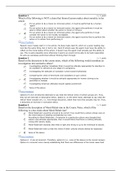Exam (elaborations)
PHIL 2100 Health Ethics Weekly Quizzes: Questions and Answers
- Institution
- Memorial University Of Newfoundland (MUNSU )
PHIL 2100 Health Ethics: Questions and Answers to questions found throughout the weekly online quizzes. Final grade received in course: 86
[Show more]



